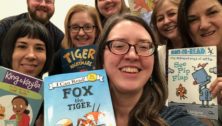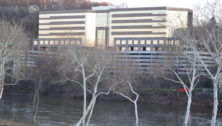Montgomery County Leadership: Eric Goldstein, Executive Director, King of Prussia District

MONTCO Today speaks with Eric Goldstein, Executive Director of the King of Prussia District about growing up the middle of five children in New York and New Jersey, his love of music, and how persistence and determination got him his first job in a record store.
He also discusses how his career path to the KOP-BID went through Maryland, Kansas, and West Philadelphia and what transportation project he’s focused on this year.
Where did you grow up, Eric?
I was born the middle child of five children in the Bronx in December 1968 and spent 10 years in Tappan, New York, and then my teenage years in Upper Saddle River in Bergen County, New Jersey. Both towns are located northwest of New York City.
What did your parents do for a living?
My mother was a homemaker who eventually found her way into nuclear medical sales. My father did a lot of different things from owning a music store to working in a car dealership. My stepfather was an insurance salesman and then a financial advisor.
That’s a big disparity between what your father and stepfather did?
For me, it felt like two different lives. My younger years were marked by memories of my family not having much money. With my stepfather, we seemed to travel more and do more as there was a lot more money around the house.
Why did your family move from the Bronx to Tappan?
I was only a couple of weeks old when my parents moved. I would imagine my parent’s motivation was the same thing that drove many families to make the same move from city to suburb: good schools, greener pastures, a yard.
What memories do you have of growing up in Tappan?
My long-term memory has always been horrible but I do remember doing a lot of things as a very young kid that no parent in their right mind would let a child do today.
Like what?
Being eight years old, for instance, and taking the bus to the Mall, 20 minutes away from where we lived, which a friend and I often did. Walking and playing on railroad tracks and biking long distances from home and back. We were not even ten years old. I would not let my kids do those things today!
What was your first job, Eric?
I’ve always been a big fan of music. Starting in grade school, I played the trumpet, the drums when I was a teenager, and then the guitar since my early 20s.
Since I was fascinated by music and bands, I wanted a job in a record store. One morning I rode my moped to a record store, four or five miles from my house, to apply for a job only to have the owner of the store tell me he wasn’t hiring.
I was disappointed of course, but went back to the same store and asked again the next day. The owner told me he wasn’t hiring again. When I went back again on the third day, the record store owner relented and said he would hire me.
What lessons did you take from that job in the record store that stay with you today?
The lesson I learned goes back to how I got the job in the first place; don’t always accept no for a final answer. If you want something bad enough, keep working to find a way to make it happen.
Where did you get that persistence and gutsiness?
I suppose that a lot of that persistence came from my mother. She was not only feisty but a hard worker as well. There were a lot of times when she had three jobs at once. Not because she needed the money, but because she loved pursuing and accomplishing things.
Where did your get your love of music?
My birth-father was a piano player who went to a performing arts high school in NYC. Later in life, he owned a piano and organ store in Rockland County. My older brother and sister were always jamming the classic rock tunes as well, and I am sure I picked up a lot of the love of music from them.
What kind of music did you like?
There was so much! The first bands I was really into were Ozzie Osbourne and Judas Priest. I started kind of hard! Then, somehow, I found myself listening to southern rock bands like the Marshall Tucker Band and Charlie Daniels. After that, I got very single-band specific. For two or three years in a row, I was listening to nothing but Van Halen followed by nothing but Rush. After that, and ever since I’ve been the biggest fan of Pink Floyd. Quite an eclectic journey.
Did you play any sports in high school or college?
I played baseball up until eighth grade and then nothing after that. It seems that I liked working and making money far more than I liked playing sports.
What did you do after high school?
I started as an architecture student at the University of Maryland, but that didn’t go too well. I was immature, plus my parents were going through a divorce, so I was not quite prepared to focus on school. After a year and a half, I was ready to drop out and just go to work for my brother, who owned a landscaping company in northern N.J.
During a break in school, I visited my high school drafting teacher who encouraged me to explore Landscape Architecture instead of dropping out. I applied and was accepted to Rutgers University. I finished three years later with an undergraduate degree in landscape architecture.
Then what?
Once I graduated, I went to work for my brother’s company. I helped him build up a landscape design and construction division. After a couple of years, I realized that wasn’t what I wanted to do for the rest of my life. By this time, I was married, and my wife convinced me to go to graduate school. I applied and was accepted at Kansas State University’s landscape architecture program.
Did Kansas end up being a good choice for you?
Absolutely! Living in Kansas changed everything for me and led to my first landscape architecture job. The Kansas State program had a great reputation and drew companies from all over the United States to recruit. Wallace, Robert and Todd, a big landscape architecture and planning firm, based in Philadelphia, made me an offer.
The firm offered me a position in either their Philadelphia or Coral Gables office in Florida. Since Philadelphia was closer to Yankee Stadium, I chose Philadelphia! I was 25. That’s how 25-year-olds make decisions!
How did the opportunity at the District come along?
I worked at WRT for a year and then the Pennsylvania Horticultural Society for a couple of years. I worked on some amazing projects at the Horticultural Society and built up a great network of contacts. Through that network, I landed a job at the University City District (UCD), my first experience working for a business improvement district (BID).
I stayed at the University City District for seven years, after eventually becoming its Executive Director, and then moved on to a seven-year stint in real estate development for a private, for-profit company in New Jersey.
The opportunity in King of Prussia came along in 2010, and I jumped at it.
What drew you back to managing and leading a BID?
I love what BIDs do! I like the fact that BIDs have a specific focus and target area and can execute projects quickly. The property owners who invest in BIDs like the quick results and appreciate the fact that their investments in the BID make life better for the entire service area. I saw that happen in the University City in the late ’90s and I am seeing it again in King of Prussia.
What was your impression when you first took the job leading King of Prussia’s District?
Unlike my job at the University City District, which, when I took that job in 1998, was experiencing really tough public safety and cleanliness challenges, King of Prussia was more of a suburban planning challenge.
When I came on in January 2011, my challenge was to work with the Township and property owners to see how to take this sprawling suburban community that was experiencing a number of hardships coming out of the recession and make it into something that residents, employees, and companies were looking for in the face of changing demographic preferences.
Unlike the University City District, we didn’t have to address crime or cleanliness issues. Our challenges were centered more around marketing, public perceptions, zoning, and transportation.
What challenges are in front of you for the balance of 2017?
From a project standpoint, we are trying to complete the design of a very unique 2.6-mile linear park which will turn some private property into a publicly accessible park in the old King of Prussia business park. It is a unique project and has a number of large challenges. We hope to start construction in 2018.
As a small nonprofit organization with very aggressive goals and objectives that require ongoing financial and human resources, finding the funding to sustain some of our projects always remains a top priority.
The financial resources challenges are clear. What are your pressing people issues?
We have big goals and objectives and, although we have a small staff, they are excellent at executed those goals and objectives. Our organization has a lot of things it wants to accomplish, and my most pressing people issue is finding a balance of continuing to accomplish things for our stakeholders without overworking or burning out the staff.
What additional capabilities or resources do you see the District adding?
Eventually, I would like to have a person on staff that helps program and manage the Linear Park in the business park. It would likely be a part-time, seasonal job.
Other than that, we still have a lot of work to do to accomplish the original goals & objectives that were set back in 2010 at the founding of the organization.
What about King of Prussia itself? What is your 2017 focus?
Our biggest focus this year is transportation. We have a funding issue related to the employee shuttles that we run and we need to solve that before the end of the year for the shuttles to continue into 2018.
We are also focused on the King of Prussia Rail project which will eventually link KOP to the Norristown Transportation Center as well as University City and Center City, Philadelphia.
Long term, we are exploring improved connections to the Pennsylvania Turnpike to alleviate some of the current congestion. Solving the congestion issue is important not just for those who shop or work in the District, but for residents of the district as well!
Finally, Eric, what is the best piece of advice you ever received?
The best piece of advice came to me recently and it is “how you do each thing, is how you do everything!” In other words, it doesn’t matter whether you’re mowing your lawn or trying to solve some significant regional transportation challenge, you need to do your best each and every day and with each and everything you’re doing. If you do that, the cumulative total will yield great results. I guess it’s more of a philosophy than advice, but that’s what I have!
Stay Connected, Stay Informed
Subscribe for great stories in your community!
"*" indicates required fields


![95000-1023_ACJ_BannerAd[1]](https://montco.today/wp-content/uploads/sites/2/2023/03/95000-1023_ACJ_BannerAd1.jpg)


























![ForAll_Digital-Ad_Dan_1940x300[59]](https://montco.today/wp-content/uploads/sites/2/2022/06/ForAll_Digital-Ad_Dan_1940x30059.jpg)












